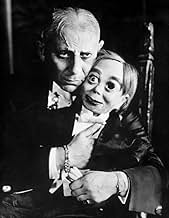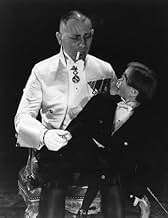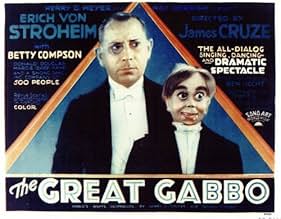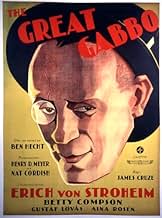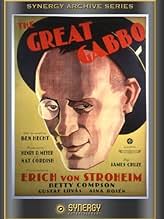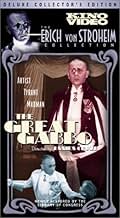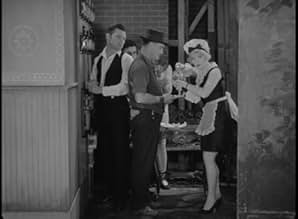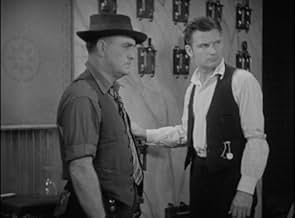VALUTAZIONE IMDb
6,0/10
1080
LA TUA VALUTAZIONE
Aggiungi una trama nella tua linguaAn insanely, egocentric ventriloquist, even though he is possessed by his wooden dummy, is in love with a dancer who is in love with another. The dummy gives advice to the ventriloquist.An insanely, egocentric ventriloquist, even though he is possessed by his wooden dummy, is in love with a dancer who is in love with another. The dummy gives advice to the ventriloquist.An insanely, egocentric ventriloquist, even though he is possessed by his wooden dummy, is in love with a dancer who is in love with another. The dummy gives advice to the ventriloquist.
Erich von Stroheim
- The Great Gabbo
- (as Eric Von Stroheim)
Marjorie Kane
- Babe
- (as Margie 'Babe' Kane)
George Grandee
- Otto
- (voce)
- (non citato nei titoli originali)
Bo Peep Karlin
- Dancer
- (non citato nei titoli originali)
Rosina Lawrence
- Dancer
- (non citato nei titoli originali)
Harry Ross
- Performer
- (non citato nei titoli originali)
Eddy Waller
- Vaudevillian
- (non citato nei titoli originali)
Marbeth Wright
- Dancer
- (non citato nei titoli originali)
Recensioni in evidenza
As director and actor Erich Von Stroheim did some very weird films and The Great Gabbo is certainly one of them. In this Von Stroheim is a star attraction in a Ziegfeld Follies type stage review and he is fixated on Betty Compson who used to be his assistant in his act, but walked out on him because he treated her shabbily.
Now she is keeping company with Donald Douglas a young hoofer in the show. He's actually upset as well with her interest in Von Stroheim.
In a way it's hard to review this because just the name of Erich Von Stroheim brings up images of barbaric cruelty show on the screen. The name alone is sufficient to conjure up horrible images.
So Von Stroheim wants to set up house with her and his dummy Otto. As in most ventriloquist stories the dummy functions as an alter ego.
All this with the backdrop of a Ziegfeld type show. That was interesting and like Glorifying The American Girl, The Great Gabbo is a nice filmed record of what these shows were like on stage.
Although Von Stroheim is always interesting, The Great Gabbo's best value is as a record of the type musical revue so popular back then.
Now she is keeping company with Donald Douglas a young hoofer in the show. He's actually upset as well with her interest in Von Stroheim.
In a way it's hard to review this because just the name of Erich Von Stroheim brings up images of barbaric cruelty show on the screen. The name alone is sufficient to conjure up horrible images.
So Von Stroheim wants to set up house with her and his dummy Otto. As in most ventriloquist stories the dummy functions as an alter ego.
All this with the backdrop of a Ziegfeld type show. That was interesting and like Glorifying The American Girl, The Great Gabbo is a nice filmed record of what these shows were like on stage.
Although Von Stroheim is always interesting, The Great Gabbo's best value is as a record of the type musical revue so popular back then.
Once again I am dumbfounded at how a great movie can get such a low rating on IMDb. All I can guess is that most of the voters were expecting to see a Gene Kelly-type musical. If this describes you, then leave now. "The Great Gabbo" is about as ANTI-musical as a musical can get. It is a heavy, ponderous, gripping story with more drama than Francis Ford Coppola could ever eke out of a reel of film. It is a compelling and surprisingly complex journey into the mind of a bizarre man.
This is the story of a misunderstood artist whose canvas is a puppet. But whereas the stereotypical story of the misunderstood artist depicts the protagonist as a static character, Gabbo is a highly dynamic individual who keeps us guessing throughout. Is he a good man? Is he a bad man? Is he sane? Is he mad? These questions are not answered until the spectacular & powerful finale, and even then there is much room for speculation.
(As an aside to you Kurosawa fans, the structure of this film is much like Kurosawa's 1952 classic "Ikiru", at times slow but building up to a powerful and unforgettable finish. And the final image deserves its place in the Louvre.)
Regardless of if you're prepared for this type of experience, one thing is for sure: the amazing performance of Erich von Stroheim will burn itself into your mind forever. This film, being one of the early talkies, does not mix much dialogue and music. That is, the spoken scenes are done in silence with no music underneath (much like the 1931 Fritz Lang masterpiece "M"). This means that the actors must carry the entire scene on their shoulders, like in the old days of Shakespearian soliloquies. Erich von Stroheim rises to the challenge in this minimalist setting, and HE DELIVERS. In some scenes he makes you hate him. In others you love him. He can elicit pity as well as admiration. What a roller-coaster ride! Pitted against the heavy drama, the musical numbers seem jarring and incongruous at first. But on further reflection we realize that this emphasizes the bipolar, schizophrenic nature of the subject. Just like Gabbo, a man divided between two worlds, this film divides itself between Broadway musical and psychological thriller. This movie was at least 80 years ahead of its time, if not more.
That's all I'll say because the rest is best experienced as a surprise. This is the best film I've seen in a long time, and the only reason why I'm rating it an 8 instead of a 10 is that, sadly, the original colour scenes were lost, and some of the scenes are in need of restoration on my DVD copy. We can only dream of what it was like to see "The Great Gabbo" as it was originally shown in 1929.
This is the story of a misunderstood artist whose canvas is a puppet. But whereas the stereotypical story of the misunderstood artist depicts the protagonist as a static character, Gabbo is a highly dynamic individual who keeps us guessing throughout. Is he a good man? Is he a bad man? Is he sane? Is he mad? These questions are not answered until the spectacular & powerful finale, and even then there is much room for speculation.
(As an aside to you Kurosawa fans, the structure of this film is much like Kurosawa's 1952 classic "Ikiru", at times slow but building up to a powerful and unforgettable finish. And the final image deserves its place in the Louvre.)
Regardless of if you're prepared for this type of experience, one thing is for sure: the amazing performance of Erich von Stroheim will burn itself into your mind forever. This film, being one of the early talkies, does not mix much dialogue and music. That is, the spoken scenes are done in silence with no music underneath (much like the 1931 Fritz Lang masterpiece "M"). This means that the actors must carry the entire scene on their shoulders, like in the old days of Shakespearian soliloquies. Erich von Stroheim rises to the challenge in this minimalist setting, and HE DELIVERS. In some scenes he makes you hate him. In others you love him. He can elicit pity as well as admiration. What a roller-coaster ride! Pitted against the heavy drama, the musical numbers seem jarring and incongruous at first. But on further reflection we realize that this emphasizes the bipolar, schizophrenic nature of the subject. Just like Gabbo, a man divided between two worlds, this film divides itself between Broadway musical and psychological thriller. This movie was at least 80 years ahead of its time, if not more.
That's all I'll say because the rest is best experienced as a surprise. This is the best film I've seen in a long time, and the only reason why I'm rating it an 8 instead of a 10 is that, sadly, the original colour scenes were lost, and some of the scenes are in need of restoration on my DVD copy. We can only dream of what it was like to see "The Great Gabbo" as it was originally shown in 1929.
If there ever was any schizophrenic example of musicals then that would be 'The Great Gabbo'. This is disturbing psychological drama interrupted by lavish and wonderful dance and music numbers. James Cruze is credited as a director but to be honest most of the non-musical scenes have von Stroheim all written over them. And not only because von Stroheim played in them but there is some sort of very specific psychologically tense atmosphere in them. It is unknown to me how much control von Stroheim had over the production but it is clear (to everyone familiar with von Stroheim's work) that he at least gave some instructions.
The film is much more than just a curiosity - two seemingly different movies, a psychological drama, and a musical tied together. Erich von Stroheim brilliantly plays brilliant ventriloquist Gabbo who is mad or driven mad by his art. When we first meet Gabbo on the screen, we see an unpleasant cruel man who in his egocentrism and perfectionism blames everyone else for his failures. After his lover and partner Mary (Betty Compson) drops the tray in the middle of the performance, he accuses her again. She leaves her but not with a light heart. Pass the two years and they both have worked their way up into Broadway. They meet again when they both appear in the same review show.
The dramatic parts concentrating on Gabbo and his relationships with other people are good but quite poorly developed. Probably because of the forceful inclusion of the musical numbers that do nothing to forward the story or even add anything to it. And this is crystal clear while watching the movie. These would have worked in a lesser amount as just a backdrop for the story. Although, I have to say the musical numbers were interesting to watch but that was the wrong movie for them. The dramatic parts are heavy and the sudden transition into the musical numbers puts the viewer off. Although the musical numbers separately are interesting I found them distracting and thus it made it difficult to follow the story.
Although the movie is inconsistent and didn't quite work, it is still worth watching especially for its uniqueness in the musical category.
The film is much more than just a curiosity - two seemingly different movies, a psychological drama, and a musical tied together. Erich von Stroheim brilliantly plays brilliant ventriloquist Gabbo who is mad or driven mad by his art. When we first meet Gabbo on the screen, we see an unpleasant cruel man who in his egocentrism and perfectionism blames everyone else for his failures. After his lover and partner Mary (Betty Compson) drops the tray in the middle of the performance, he accuses her again. She leaves her but not with a light heart. Pass the two years and they both have worked their way up into Broadway. They meet again when they both appear in the same review show.
The dramatic parts concentrating on Gabbo and his relationships with other people are good but quite poorly developed. Probably because of the forceful inclusion of the musical numbers that do nothing to forward the story or even add anything to it. And this is crystal clear while watching the movie. These would have worked in a lesser amount as just a backdrop for the story. Although, I have to say the musical numbers were interesting to watch but that was the wrong movie for them. The dramatic parts are heavy and the sudden transition into the musical numbers puts the viewer off. Although the musical numbers separately are interesting I found them distracting and thus it made it difficult to follow the story.
Although the movie is inconsistent and didn't quite work, it is still worth watching especially for its uniqueness in the musical category.
This is a strange little number because it's a pretty dark subject matter, which at times is pretty chilling to watch, but then they throw in lots of songs. I'm not too sure what the Directors were going for when they filmed this. I say this because it's evident, at times, that quite a few scenes were added later... and I cannot figure out why.
I really like the idea of the mad ventriloquist. In this stories concept, he is in love with his assistant, Mary (Compson), though finds it hard to fully converse with her. As The Great Gabbo (Erich von Stroheim), as he sees himself, he's nasty, offensive, and disagreeable. However, when he speaks through the dummy he can be loving and charming. It's this fissure that eventually leads to his mental breakdown.
I know that the musical moments are there because it's set in the vaudeville and theatre life, though for most of the time these feel more like padding - filling out time. I think this could be remade and be an actually powerful movie. Reduce the musical side and expand on the breakdown. There are times in this movie where chills ran down my spine. The part where Mary walks out on The Great Gabbo and the Dummy calls her softly back, to be reprimanded by Gabbo is both heartbreaking and creepy as hell.
The film, in general, is entertaining, though I have to say I found the number of musical intermissions too much. These are also 1920's musicals so are not so relevant today. Also, the dancing isn't up to par with bigger productions. Though I have to say the scene where Mary throws herself off a giant spiders web to be caught inches from the ground is breathtaking. I would say, for all creepy doll fans and those who like a psychological edge to their dramas, it's worth a watch.
I really like the idea of the mad ventriloquist. In this stories concept, he is in love with his assistant, Mary (Compson), though finds it hard to fully converse with her. As The Great Gabbo (Erich von Stroheim), as he sees himself, he's nasty, offensive, and disagreeable. However, when he speaks through the dummy he can be loving and charming. It's this fissure that eventually leads to his mental breakdown.
I know that the musical moments are there because it's set in the vaudeville and theatre life, though for most of the time these feel more like padding - filling out time. I think this could be remade and be an actually powerful movie. Reduce the musical side and expand on the breakdown. There are times in this movie where chills ran down my spine. The part where Mary walks out on The Great Gabbo and the Dummy calls her softly back, to be reprimanded by Gabbo is both heartbreaking and creepy as hell.
The film, in general, is entertaining, though I have to say I found the number of musical intermissions too much. These are also 1920's musicals so are not so relevant today. Also, the dancing isn't up to par with bigger productions. Though I have to say the scene where Mary throws herself off a giant spiders web to be caught inches from the ground is breathtaking. I would say, for all creepy doll fans and those who like a psychological edge to their dramas, it's worth a watch.
This film about a ventriloquist who lives a self-imposed life of lonliness because of his personality is absorbing, different, and dated. Shortly produced after The Jazz Singer(1927), the film is an early talkie with all the characteristics of an early talkie. It has somewhat stilted stages, little camera movement, and most annoying, a bunch of Busby Berkley type musical numbers that have little to do with the plot. All that notwithstanding, the lead role of Gabbo, a man who lives to be successful no matter what it takes, who is willing to forsake personal happiness to achieve, who runs the scope of emotions in minutes, is played with gusto by that wonderful actor(and even greater director) Erich Von Stroheim. Von Stroheim uses all his European charm(and decadence) as the man who shares life and lives with and through his dummy Otto. There are no supernatural aspects about the relationship with Gabbo and Otto. The movie is in no way a horror picture(although very often advertised as such). It really is a story of the problems a man has exhibiting his emotions, living with others, and living with himself. Some of the scenes are very well-done, including the last shot as we see Gabbo avoid a ladder. The rest of the cast is effective with Betty Compson as a love interest doing a fine job, and Donald Douglas as a lead singer/romantic figure being absolutely absurd. If for no other reason, see the film to see Von Stroheim in action. There was no one like him.
Lo sapevi?
- QuizThe dummy Otto was a hand carved basswood Frank Marshall figure. The same man who designed Edgar Bergen's famous characters Charlie McCarthy and Mortimer Snerd.
- BlooperOverlooking the seeming impossibility of Gabbo having Otto the Dummy speak while Gabbo is eating, smoking, and drinking, Otto's head and mouth move with the words and music when Gabbo is at least six feet away.
- Versioni alternativeIl gran Gabbo (1929) was originally released by Sono Art-World Wide Pictures, with certain sequences were presented in Multicolor. However, current prints, restored by the Library of Congress and released by Kino International on DVD, exist only in black-and-white. Most, perhaps all, VHS and DVD releases of the film have the color sequences in black and white.
- ConnessioniEdited into The Girl from Calgary (1932)
- Colonne sonoreEvery Now and Then
(uncredited)
Written by King Zany and Donald McNamee
Performed by Marjorie Kane and Donald Douglas
I più visti
Accedi per valutare e creare un elenco di titoli salvati per ottenere consigli personalizzati
Dettagli
- Data di uscita
- Paese di origine
- Lingue
- Celebre anche come
- The Great Gabbo
- Luoghi delle riprese
- Azienda produttrice
- Vedi altri crediti dell’azienda su IMDbPro
- Tempo di esecuzione
- 1h 32min(92 min)
- Colore
Contribuisci a questa pagina
Suggerisci una modifica o aggiungi i contenuti mancanti

